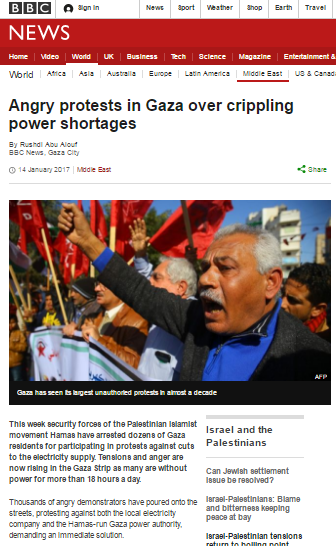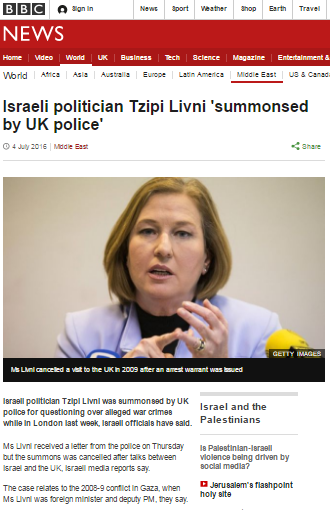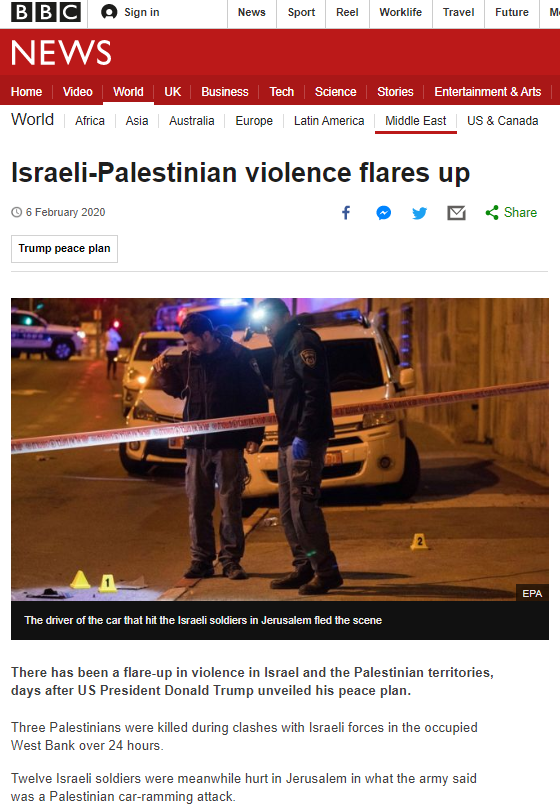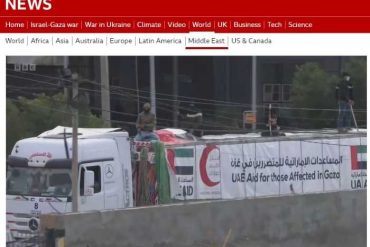It was a predictably sunny and warm July morning and I was hanging laundry out to dry on the terrace of my home in northern Israel when, ten years ago today, the sound of unusually intense aircraft activity overhead prompted me to go inside and turn on the radio. Confused reports of missile fire from Lebanon and a cross-border raid in which two Israeli reservists had been kidnapped and several others killed signalled the start of the ensuing thirty-four day conflict – known in Israel as the Second Lebanon War.
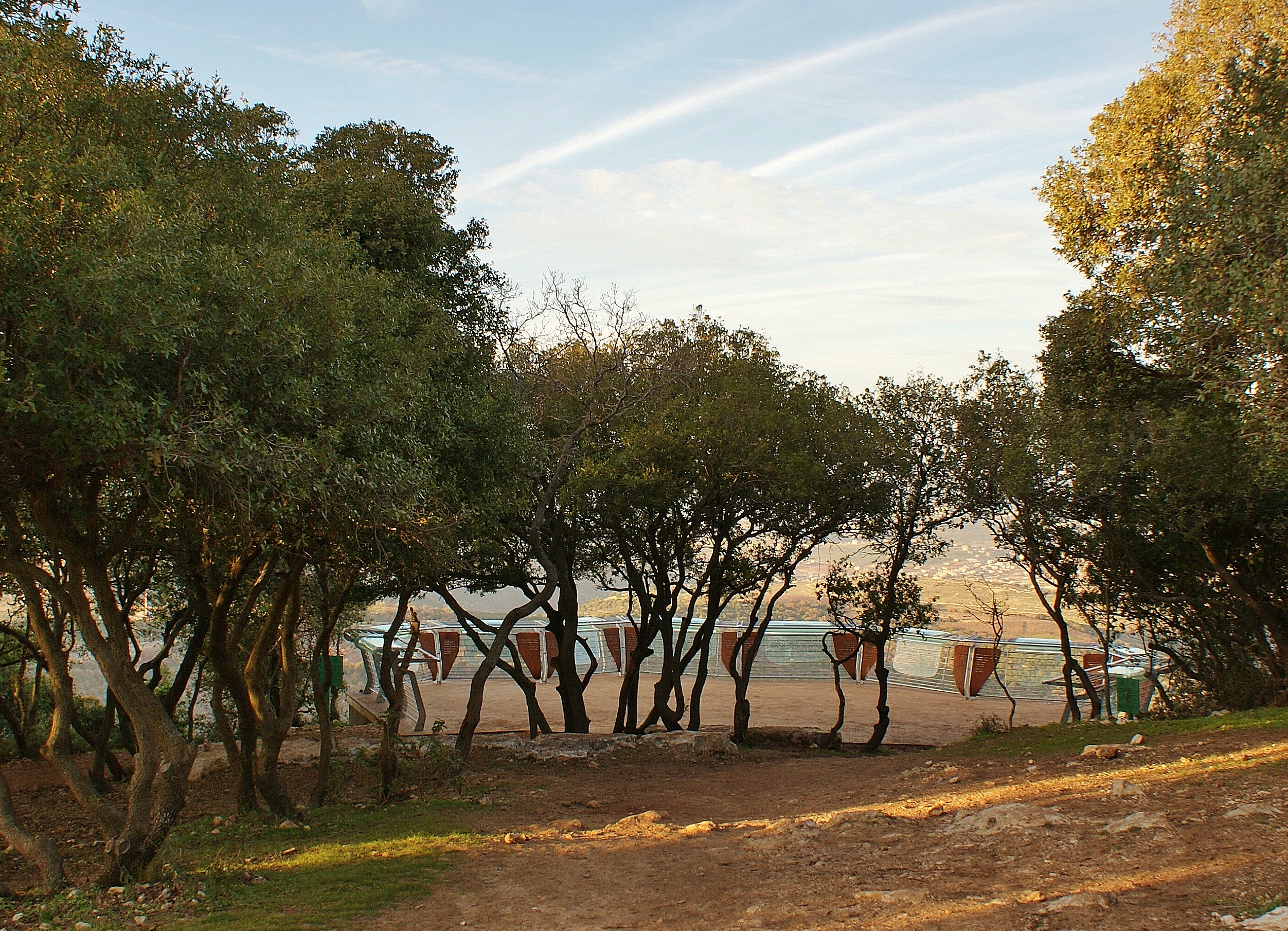
Many of us of course recall exactly how that war began, continued and ended but would a member of the public unfamiliar with the details (perhaps a British student too young to remember) searching online today for information on that topic from the trusted BBC get a realistic, impartial and accurate picture of events? Over the next few weeks we will be taking an occasional retrospective look at the BBC’s coverage of that war and the information which remains online as “permanent public record“.
The fact that the BBC’s management of online content does not include tagging means that the results of searches are erratic: it is not possible for a member of the public to conveniently find all the relevant content produced by the BBC in one place and in chronological order.
In this post we will look at how BBC content still available online portrays the events which began the conflict: Hizballah’s infiltration into Israeli sovereign territory, its kidnapping of two Israeli reservists and the killing of eight other soldiers in that cross-border raid and the simultaneous missile attacks on Israeli civilian communities by Hizballah.
One of the first results appearing in a search of the BBC News website is an article from 2008 titled “2006: Lebanon war” which describes those events as follows:
“After eight Israeli soldiers had been killed and two captured by the Lebanese group Hezbollah, Israel and Hezbollah engaged in a 33-day war in which Hezbollah fired a hail of rockets into Israel and the Israelis bombed Lebanese towns, villages and infrastructure but made little headway in ground operations.”
In other words, audiences are not told that Hizballah initiated the conflict by carrying out a cross-border raid into Israeli territory or that it concurrently fired missiles at Israeli civilian communities before any Israeli response took place.
That initial missile fire at Israeli civilian communities is also absent from the portrayal of the beginning of the war found in the BBC’s profile of Hizballah.
“In 2006, Hezbollah militants launched a cross-border attack in which eight Israeli soldiers were killed and two others kidnapped, triggering a massive Israeli response.”
A 2013 profile of Lebanon which is still available online and the 2015 version which supposedly replaced it both similarly ignore that missile fire and fail to inform audiences that Hizballah terrorists infiltrated Israeli territory or that eight soldiers were killed in the initial raid:
“When the Hezbollah militia seized two Israeli soldiers in a raid in July 2006, Israel responded with a 34-day military offensive and a blockade that wrecked post-civil-war stability.”
The timeline accompanying that 2015 profile gives readers no idea of where the Israeli soldiers were when they were kidnapped:
“2006 July-August – Israel attacks after Hezbollah kidnaps two Israeli soldiers. Civilian casualties are high and the damage to civilian infrastructure wide-ranging in 34-day war.”
A backgrounder titled “The Lebanese crisis explained” from 2007 erases both the cross-border raid and the accompanying missile fire from audience view:
“The capture of two Israeli soldiers by Hezbollah provoked a month-long Israeli onslaught.”
One might perhaps assume that during July and August 2006, reporting would have been more accurate considering the proximity to the event. Articles from the first day – July 12th 2006 – did indeed give a reasonable account of events, although they failed to describe Hizballah as a terrorist organisation.
“Lebanese guerrillas have captured two Israeli soldiers in a cross-border raid, triggering the first Israeli land incursion into the country since 2000. […] On Wednesday morning, Hezbollah launched dozens of Katyusha rockets and mortar bombs at the Israeli town of Shlomi and at Israeli outposts in the Shebaa Farms area.” (July 12, 2006)
Three Israeli troops were killed in Hezbollah’s cross-border raid and four more died in the subsequent offensive. […] On Wednesday morning, Hezbollah launched dozens of Katyusha rockets and mortar bombs at the Israeli town of Shlomi and at Israeli outposts in the Shebaa Farms area.” (July 12, 2006)
“Hezbollah fighters based in southern Lebanon launch Katyusha rockets across the border with Israel, targeting the town of Shlomi and outposts in the Shebaa Farms area.
In a cross-border raid, guerrillas seize two Israeli soldiers before retreating back into Lebanon, insisting on a prisoner exchange and warning against confrontation. Israeli Prime Minister Ehud Olmert describes the capture of the soldiers as “an act of war”.” (“Day-by-day: Lebanon crisis – week one”, July 19, 2006)
However, it was not long before reports appeared which failed to provide readers with the exact details of the event which sparked the war and the fact that Hizballah terrorists had crossed an international border whilst attacking civilian communities with missile fire was not consistently communicated to BBC audiences.
“Israel is imposing an air and sea blockade on Lebanon as part of a major offensive after two soldiers were seized by the militant group Hezbollah. […] Eight soldiers were killed and two were injured, in addition to the two captured in a Hezbollah ambush.” (July 13, 2006)
“Israel launched its assault and blockade after Hezbollah fighters captured two of its soldiers last Wednesday.” (July 18, 2006)
“Israel launched attacks on Lebanon after Hezbollah captured two Israeli soldiers in a cross-border raid eight days ago.” (July 20, 2006)
“The nine days of fighting – triggered by the capture of two Israeli soldiers by the militant Hezbollah group in a cross-border raid – have left 29 Israelis dead, including 15 civilians killed by rockets fired by Hezbollah into Israel.” (July 20, 2006)
“More than 380 Lebanese and 42 Israelis have died in nearly two weeks of conflict in Lebanon, which began after Hezbollah captured two Israeli soldiers in a cross-border raid on 12 July.” (July 26, 2006)
“At least 423 Lebanese and 51 Israelis have died in the violence since Hezbollah captured two Israeli soldiers in a cross-border raid on 12 July.” (July 27, 2006)
“A total of 51 Israelis, including at least 18 civilians, have been killed in the conflict, sparked by Hezbollah’s capture of two Israeli soldiers in a cross-border raid earlier in July.” (July 30, 2006)
“Humanitarian groups say Israeli military action is hampering efforts to help many of the hundreds of thousands who have fled the fighting – sparked by the capture of two Israeli soldiers by Hezbollah on 12 July.” (August 7, 2006)
An August 10 2006 report from the BBC’s diplomatic correspondent inaccurately leads readers to believe that Hizballah’s missile fire began after the cross-border raid.
“The IDF’s initial response to the seizure of its two soldiers and the killing of their comrades inside Israeli territory by a Hezbollah unit and the ensuing rocket fire was to launch a punishing air campaign.”
Content produced after the conflict ended is often even less accurate.
A report from southern Lebanon from 2007 ignores the initial missile fire and the killing of eight Israeli soldiers during the initial raid.
“Previously the area had become the fiefdom of Hezbollah, the Shia Islamist and militant movement whose cross-border raid on 12 July – snatching two Israeli soldiers – was the catalyst for the 34-day conflict.”
A 2008 article about a music festival in Lebanon provides readers with no information as to how the war started:
“But in 2006, the festival was cancelled as war broke out between Israeli and the Shia Muslim movement Hezbollah.”
A report from 2009 erases the initial missile fire on Israeli civilian communities:
“The 2006 war was triggered by a Hezbollah raid into Israel, in which the group seized two soldiers and killed others.”
An article from 2014 gives no information concerning the events which sparked the conflict.
“Israel and Hezbollah fought a war in 2006, during which Israeli warplanes bombed Hezbollah strongholds in southern Lebanon and in Beirut, while Hezbollah fired about 4,000 rockets at Israel.”
Obviously members of the public conducting a search for BBC content in order to understand why the Second Lebanon War began would receive differing impressions depending upon the reports which happened to come up in their search. The BBC’s “permanent public record” is inconsistent, frequently inaccurate and unreliable as a source of factual information.
The least that can be done is for the profiles of Lebanon and Hizballah, which are still in use and to which links are often provided in contemporary reports, to be amended to provide an accurate, impartial and comprehensive view of the actions of Hizballah which brought about the Second Lebanon War.
Related Articles:
The BBC Goes Native: A Study of BBC Arabic

